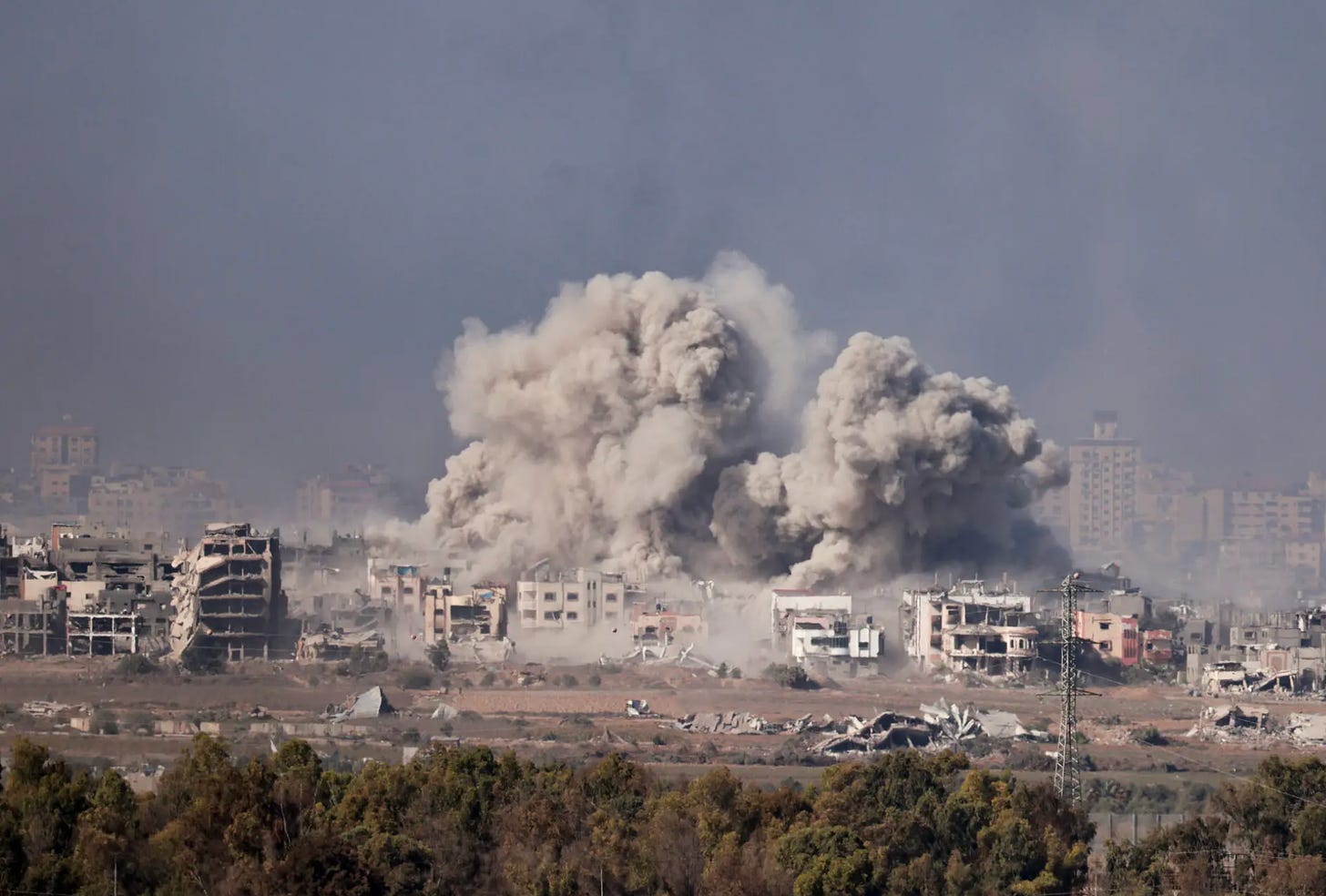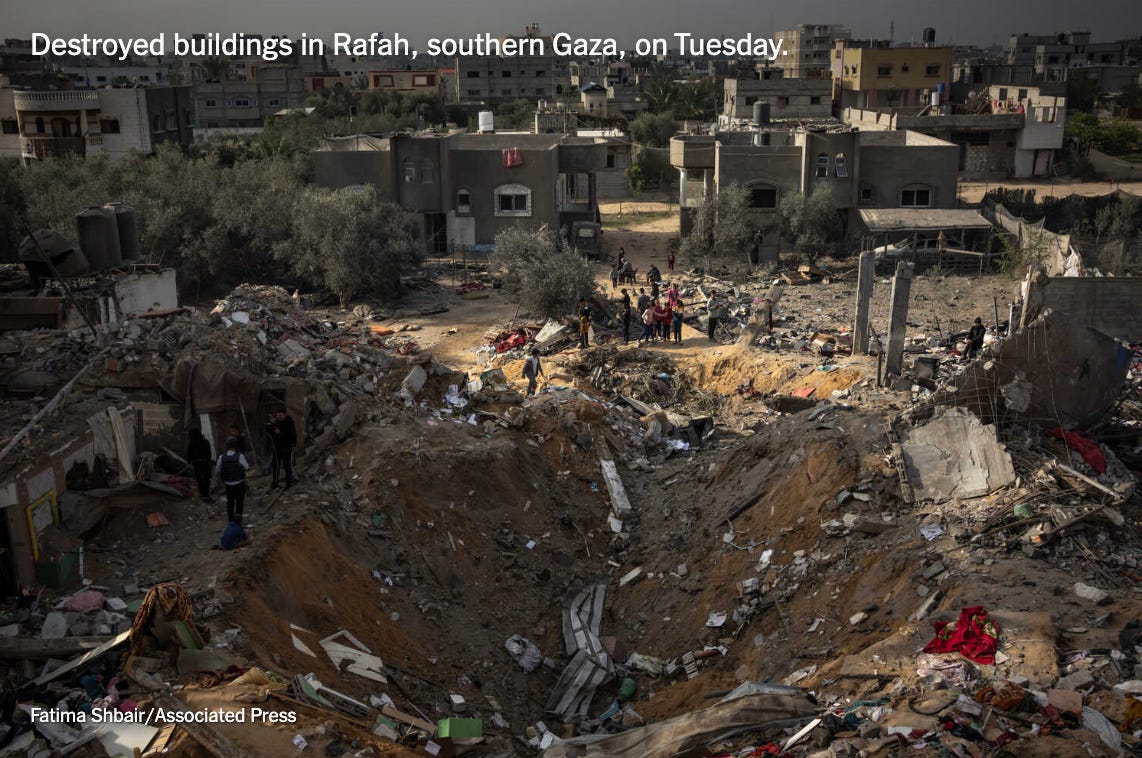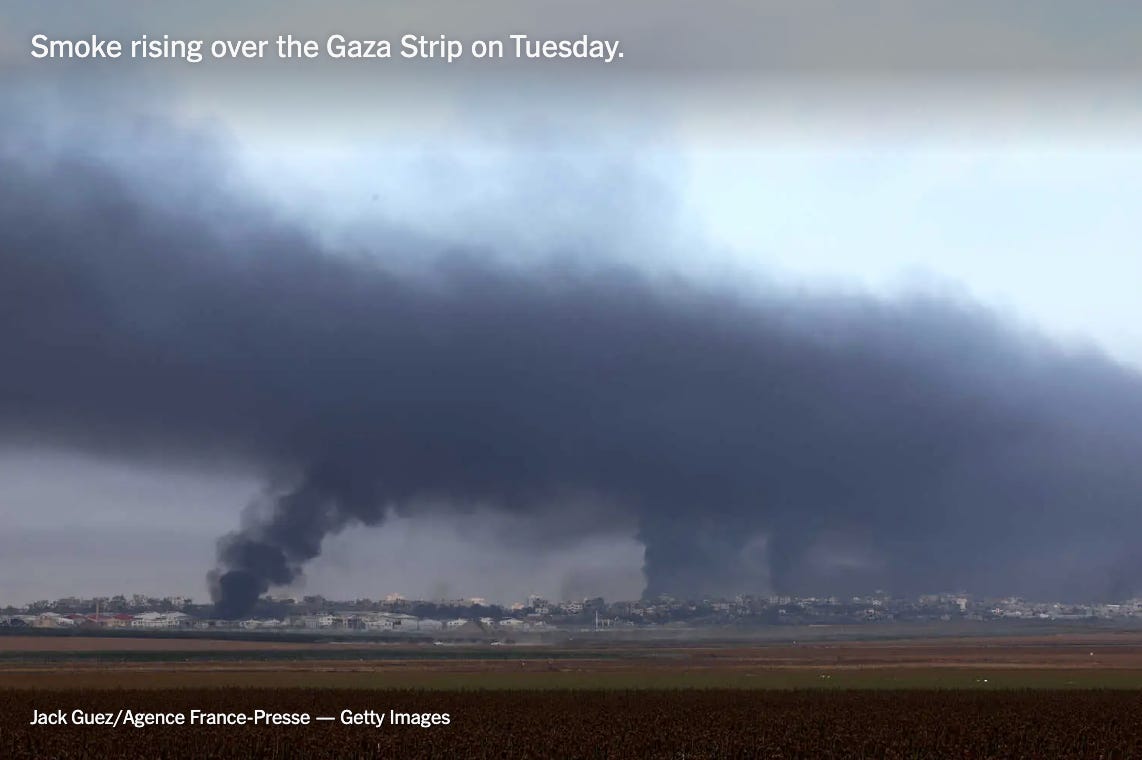Israel can't risk losing world support because of indiscriminate bombing and civilian casualties
Israel can't bomb its way to peace, and it can't maintain the support of the world by indiscriminately killing children and civilians
President Biden offered sharp criticism of Israeli Prime Minister Benjamin Netanyahu’s government Tuesday, calling for a change to the approach embraced by Israel’s leadership — which Biden described as “the most conservative” in Israel’s history. The president said Israel was beginning to lose support around the world due to “indiscriminate bombing” in remarks made during a fundraiser in Washington, and urged Israel to seek a long-term solution to the Israeli-Palestinian conflict. He added that he warned Netanyahu about repeating mistakes made by the U.S. after 9/11, while reiterating his support for Israel’s mission to “take on Hamas.”
As soon as the news of the 10/7 terror attack on Israel made its way around the world, most decent and compassionate people reeled in horror. What happened that day, turned the world’s sympathy for Israel to new and previously unknown levels. The news of the horrific atrocities that came out in the following days and weeks only solidified that support.
Hamas fighters had committed unimaginable acts of brutality upon innocent civilians and noncombatants, killing indiscriminately, raping, brutalizing, and massacring women, and visiting disgusting acts of violence upon noncombatants that violated virtually every law of war.
When Israel collected itself and went to war against Hamas, the world understood why the Jewish state’s response was so fierce and lethal. Israel wanted to obliterate every remaining vestige of Hamas, and who could blame them? Given the carnage Hamas had left behind, who among us could say we wouldn’t want to do the same?
But things began to change when Israel’s bombing of Gaza appeared to become indiscriminate. Not only did there not appear to be a coherent and clearly stated strategy, but given the densely populated nature of Gaza, the potential for killing civilians was very high. It appeared that air and artillery strikes were being randomly targeted in the most densely populated piece of real estate on Earth.
Even worse were reports of the large numbers of children who were among the casualties, something neither President Bibi Netanyahu nor the Israeli High Command seemed inclined to address.
And so, for two months, the world has seen video clips of wounded and dead children, victims of Israeli artillery and air strikes. If there’s been a clear strategy in place to avoid civilian casualties, neither the Israeli government nor the Army have bothered to elucidate that plan.
There are four big problems that Israel isn’t taking into account during their campaign in Gaza. These problems, if not adequately addressed, may destroy whatever Israel hopes to accomplish in Gaza.
You cannot bomb your way to peace. Never in the history of warfare has a victor been able to bomb their way to peace. It’s certainly possible to bomb your way into securing an opponent’s surrender, but that’s hardly the same thing as realistic and substantial peace.
What is Israel’s plan for the “Day After?” Netanyahu’s government has said all along that they want a government in Gaza sans Hamas. But how do they go about achieving that? How do they ensure that Hamas is no more? You can kill people, but you can’t kill an idea. How do you destroy and bury the idea of Hamas once and for all?
How do you formulate a strategy- in the world’s most densely populated plot of real estate- that will allow you to succeed without killing so many children?
Once the war is over, how do you rebuild Gaza? At this point, one in every ten buildings in Gaza City has been damaged, if not obliterated. And it’s not just buildings that have been shattered. Schools, hospitals, infrastructure, the economy- virtually everything in Gaza must be rebuilt from the ground up. Entire neighborhoods will need to be cleared and rebuilt, and no insurance company in the world will cover acts of war. Where will the money, the wherewithal, and the know-how come from?
Then there’s the court of world opinion. Where Israel once had an overwhelming surplus of goodwill and support after 10/7, their indiscriminate campaign in Gaza has frittered that support away almost to zero. “Free Palestine” has become the cry that is blocking out the cries of outrage over the 1200 massacred on 10/7. It’s almost as if 10/7- the reason for Israel’s war against Hamas- never happened. Much of the world’s sympathy has migrated to the Palestinians in the Gaza Strip.
I’m strongly pro-Israel. I fervently believe in the Jewish state’s right to exist and defend itself, but even I am reaching a point where it’s becoming difficult to hold out. I’m finding it increasingly difficult to support a campaign that indiscriminately murders civilians in such egregiously large numbers. As a former military officer and amateur military historian, I understand the terrible risk and cost of urban warfare. I also understand that Hamas has historically hidden its fighters, missiles, and warfighting materiel amongst Gaza’s civilian population.
Hamas doesn’t play by the internationally agreed-upon rules of war, so, yes, a large number of civilian casualties at the outset of the war could be attributed to Hamas’ indifference regarding Palestinian civilian safety. Two months into this war, though, with much of the civilian population having relocated to other parts of the Gaza Strip, that almost certainly no longer applies.
At the very least, the tide of public opinion is turning against the Jewish state.
The U.N. General Assembly voted overwhelmingly Tuesday for the second time to demand a humanitarian cease-fire in Gaza. The measure, introduced by Egypt, passed with 153 in favor and only 10 opposed, including the United States, Israel and a handful of smaller countries. Twenty-three members abstained.
The tally was surprising only in that it showed an increasing number of those favoring the measure, exceeding the 120 nations who voted for a similar resolution in late October. Egypt said it was acting now to overcome the refusal of the U.N. Security Council, whose mandates have the force of international law, to “shoulder its responsibility” to stop the fighting. The United States blocked a cease-fire resolution in the 15-member council last week with its veto.
Resolutions passed in the assembly, while not binding, reflect the views of the majority of the 193-nation U.N. membership.
Egyptian Ambassador Osama Abdelkhalek, describing “a despicable sign of double standards,” berated what he said were the “efforts by a minority of states that are standing against international public opinion” by using the “pretext” of “saying that Israel has the right to defend itself.” This right, he said in remarks that were greeted with wide applause, “does not absolve Israel from committing to the implementation of international law” and protecting innocent civilians. If the Israeli offensive continues, he said, “it will unfortunately mean that genocide will be used as a tool for war … and will lead the region to a full-fledged war.”
It needs to be mentioned, of course, that the United Nations has never been noted for its pro-Israel sentiments and has more often than not been actively hostile and/or virulently anti-Israel. The fact that a majority of UN nations have voted against Israel is not surprising, nor should it be taken as being particularly meaningful.
What it does reflect is the growing sense that the world is watching and is aware of the tragic situation in Gaza. While the Egyptian Ambassador may be correct to a certain degree in his outrage, the Jewish state does have the right to defend itself. But the ambassador is spot on when he declares that this right “does not absolve Israel from committing to the implementation of international law.”
However, that recognition on Israel’s part should not force it to fight with one hand tied behind its back. If Hamas is going to fight dirty, then Israel needs to be able to respond- perhaps not in kind, necessarily, but in something resembling it that Hamas will understand.
The UN should not expect to hamstring Israel while Hamas is allowed to conduct its brutal guerilla war unchecked.
The biggest problem Israel has at the moment is that the country’s President is prosecuting the war with no vision or strategy. Bibi Netanyahu’s political strategy warfighting motto appears to be “When all you have is a hammer, everything looks like a nail.” Thus, his warfighting strategy has been to roll through Gaza like a mobile Whack-a-Mole game. If a Hamas fighter or unit pops up, obliterate them first and ask questions later.
But what happens when the Israeli Army makes it to the Egyptian border and there’s nothing left to bomb or blow up? When the entirety of the Gaza Strip looks like Stalingrad in 1941, what happens next? Does Netanyahu turn the army around and head back to Israel, bombing and blowing up even more buildings and people along the way? Does he leave Palestinians in Gaza to fend for themselves?
Does he not realize that desperation and starvation breeds precisely the sort of terrorism he claims to be fighting to eliminate?
Whatever Netanyahu does, he needs to decide quickly, because he’s turning Israel, which not so very long ago had the world’s sympathy, into a pariah nation. And Israel should care about that.











The refusal of either side to deal with the facts on the ground makes everything worse. And Netanyahu knew a year in advance, warned by his own and foreign intelligence services (including Egypt's) that Hamas was gearing up for a major attack, yet did nothing.